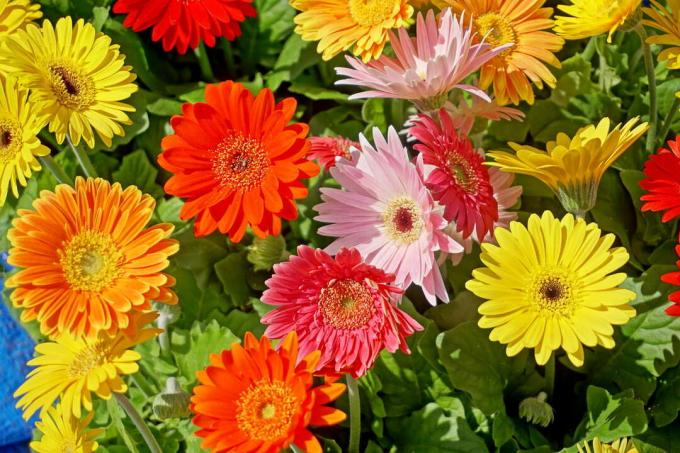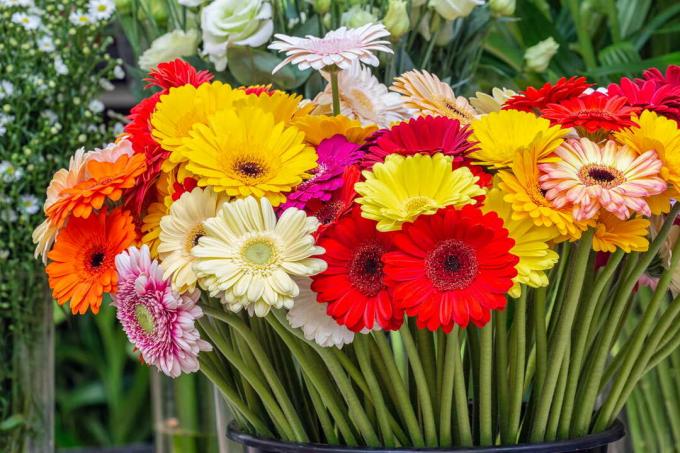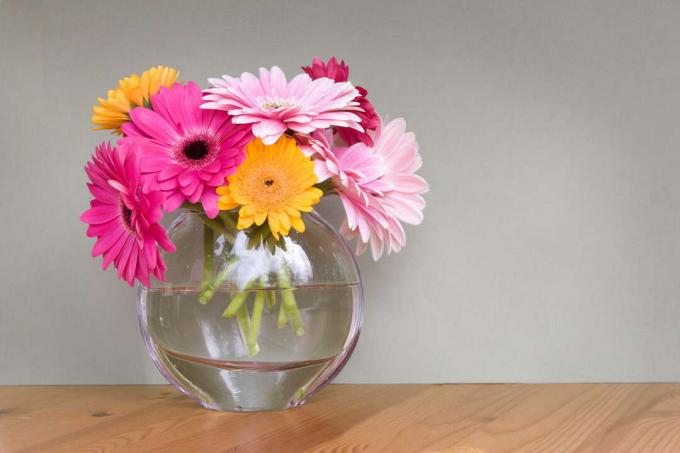Gerbera are known to us as a pot plant and cut flower. We have helpful tips to help the beautiful gerberas survive longer in pots, vases and in the garden.

"You make everything more beautiful", says the gerbera in the language of flowers and, with its intense colors and beautifully shaped flowers, brings a lot of beauty into the house and garden.
contents
- Gerbera: meaning and origin
-
Buying gerberas: what to watch out for
- Buy gerberas as cut flowers
- Buy gerberas in pots
-
Gerbera in a pot: the right care
- Gerbera in a pot: the right location
- Caring for gerberas in pots: water properly
- Caring for gerberas in pots: fertilize properly
- Wintering gerberas in a pot
- Are gerberas poisonous?
-
Gerbera in the garden
- Are gerberas hardy?
-
Gerbera in a bouquet as cut flowers
- Proper care for gerberas as cut flowers
Gerbera: meaning and origin
The gerbera, one of the most popular cut flowers in the flower trade, belongs to the daisy family (Asteraceae). Like its botanical name, its German name is Gerbera.
The original homeland of the gerbera is in South Africa. There it was known as the "African aster" until it was first described by the Dutch botanist Jan Frederik Gronovius in 1737. In honor of his botanical colleague Traugott Gerber, Gronovius named it Gerbera. Nowadays the gerbera can be found all over the world and delights the hearts of many flower lovers.
Except in shades of blue, you can get the gerbera in almost all colors and color gradations. As a cut flower, it is known with a long, elegant stem supported by a floral wire. As a potted plant, it is becoming increasingly popular with its dark green leaves.
Buying gerberas: what to watch out for
You can buy almost any type of gerbera all year round. Regardless of whether as a cut flower or a potted plant, this daisy family brings color and a good mood to every home with its beautiful flowers.

Buy gerberas as cut flowers
But what should you look out for when buying? With the gerbera for the vase, the wreath of the outer tubular flowers should already be open, but the inner wreath should still be closed. If all the tubes have already fully unfolded, the flower will not last long. On the other hand, if all the tubes are still closed, the flower could have been cut too early and the flower will probably no longer open properly.
Buy gerberas in pots
If you decide to buy a gerbera in a pot, you should make sure that the leaves of the plant are a healthy green. In addition, the flower stalks should be intact. If you discover a web of insects in the pot, it is better to keep your hands off this specimen. Gerberas are usually not very expensive. If the plants are very small, potted plants of different colors can be planted together in a larger pot or container with holes in the bottom. That looks especially pretty.
Gerbera in a pot: the right care
Gerbera are not only convincing as bought cut flowers, they also look good in pots. So they delight the hearts of many gardening friends even over a longer period of time. We briefly summarize what is important when caring for gerberas in pots.

Gerbera in a pot: the right location
The gerbera as a houseplant needs a light location. She likes morning and evening sun. In direct midday sun, however, it would "burn" quickly. In summer, the potted plant loves to be allowed to move onto the terrace or balcony. But be careful: Please do not expose the flowers to excessive sunlight. Care should also be taken here that night temperatures do not fall below 15 ° C.
In the room, a bright spot on the windowsill without intense sun is ideal.
Caring for gerberas in pots: water properly
The gerbera as a potted plant should be watered regularly. Make sure that the soil is evenly moist. You should definitely avoid waterlogging. Mix some sand under the soil, it will absorb moisture well. Some of the irrigation water can also be applied to the leaves with the help of a spray bottle. Tip: Do not spray your plants until the light exposure is reduced, otherwise the magnifying glass effect of the drops can cause "burns" on the leaves.
Caring for gerberas in pots: fertilize properly
To get a longer-lasting flowering, you should add a small amount of liquid fertilizer to the irrigation water every week from May to September. Our Plantura Organic flower & balcony fertilizer is perfectly matched to the needs of the gerbera and thus ensures abundant flowering.
Wintering gerberas in a pot
In the winter months, the gerbera is placed in a cool room. The room temperature should be between 8 and 12 ° C. Sparing watering about every 14 days is sufficient. This allows the plant to regenerate well and gather new strength for spring. Then she should also get fresh soil and, if necessary, a larger pot.
More tips on the ideal Caring for your gerberas You will find here.
Are gerberas poisonous?
Before you bring a plant into your house or garden, you naturally want to know whether it is poisonous - especially if small children or pets are part of the family. Unfortunately, the gerbera is sometimes said to be poisonous. But it is by no means. This misconception probably stems from the fact that the long stems of the gerbera are covered with many small hairs in some varieties. This fluffy hair often stimulates children to stroke it. But even if the small flowers or leaves of the gerbera were put in the mouth, there would be no risk of poisoning.

Gerbera in the garden
Are gerberas hardy?
In the summer months you can beautify the garden beds at home with the colorful gerberas. In autumn, however, the plants must be taken out of the ground and put in a pot in a suitable, cool room in the house for the winter (the temperature should be between 8 and 12 ° C). Hardy gerberas were previously unknown. If they have survived the winter in the open air, well packed, this is a godsend. Now there is a new breed, the "Garvinea". It is easy to care for, robust and a hardy gerbera tree. At -5 ° C, however, their winter hardiness is exhausted. Here, too, the plant must be well clad with straw. Please do not remove the bloomed inflorescences and leaves. In spring you can remove the dried up leaves and stems. In the case of perennials that overwinter indoors, the withered parts of the plant are removed in autumn, but they should not be cut too radically. The healthy parts of the plant should remain.
Gerbera in a bouquet as cut flowers
The gerbera is almost ideal as a cut flower. There is a sufficient variety of them all year round. It does not give off an annoying scent and goes well with almost every other cut flower. Another advantage of the gerbera as a cut flower: it is not overly expensive.

Proper care for gerberas as cut flowers
Along with the rose, the gerbera is one of the most popular cut flowers in the German flower trade. If you have been given a beautiful gerbera bouquet or have made yourself happy, then you have to make sure that the flowers are adequately supplied with water. However, the water level in the vase should not be too high so that the velvety stems do not rot. Two centimeters of water are ideal. The water should be topped up or replaced regularly. Before the bouquet goes into the vase, the stems must also be cut diagonally with a clean knife.
If the flowers are placed in a glass vase, please be careful that the wire that supports the gerbera stems can leave rust stains. If you've followed these tips, all you have to do is find a nice place for the bouquet.



